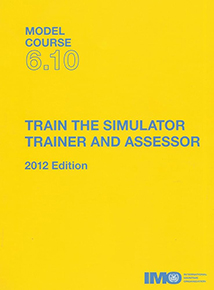
TRAIN THE SIMULATOR TRAINER AND ASSESSOR
COURSE CATEGORY: STCW
APPROVED BY: The Republic of Cyprus and the Republic of the Marshall Islands


DURATION: 5 Days
COURSE OBJECTIVES AND BENEFITS
Train The Simulator Trainer And Assessor course includes technical aspects of teaching that have a direct relation with the maritime simulator world. Without delving into the details at this stage, simulator pedagogy, as well as psychology of learning, form an important element of the course.
The topics that the course covers are providing valuable introduction for those who have little experience in teaching. It is also a very useful refresher for experienced instructors. In addition, those whose teaching experience has been limited to lecturing will gain considerable exposure, as they will explore the world of maritime simulation along with a variety of teaching techniques.
The course deals with the relevance of simulator in maritime training and the simulator pedagogy associated with the use of training on a maritime simulator. The basic aspects of learning process, purpose of training, setting of training objectives and basic principles of course design and the psychology of learning is also touched upon, however it does not form the main thrust of the course. It is assumed that course participants would have received formal training in these aspects prior to completing this programme.
Train The Simulator Trainer And Assessor course involves conventional teaching and training methods. It follows participative training techniques (such as task solving, both individually and in groups) and simulation exercises involving ‘role playing’. Train the Trainer course takes into account the practical constraints which simulator instructors face. However, it is not seeking for ‘ideal’ solutions in this part of the course. Adaptation to local circumstances is an important part of the course and trainees should demonstrate it when appropriate.
The course has a large practical component. In this, participants implement the theoretical guidelines by planning, creating, executing and evaluating their own simulation exercises.
The experiential nature of the course, largely using simulators, provides the participants the opportunity to hone the necessary skills they need to be effective simulator instructors.
Hence the scope is to:
a.Establish a reliable simulator training programme for the instructor to impart comprehensive simulator training to the seafarer that will include the amalgamation of:
-Classroom teaching
-Simulation training
-Special working environment on board a ship and the human element
-Psychology of learning
b.Foster sustainable training skills to the instructor within the changing maritime environment
c.Acquire simulator training skills that includes the psychology of learning
The instructor will control simulation exercises to sensitize the future simulator instructor to simulation technology. He will also, initially, allow the trainees to become familiar with the equipment, controls and instrumentation provided by the simulator. He will discuss about the equipment and environment fidelity with the trainees.
During exercises, trainees need to use effective bridge/engine-room/cargo procedures, and varying the environment. Trainees will also need to comply with applicable Regulations and observe the principles of various shipboard operations as set out in the relevant parts of the STCW 2010 Convention. A session for briefing and planning will precede each exercise and a debriefing will follow.


